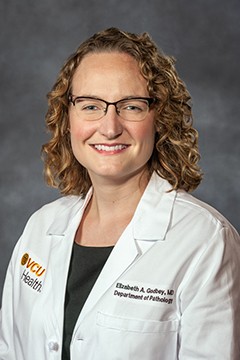 Elizabeth Godbey, MD
Elizabeth Godbey, MD
Assistant Professor of Pathology
Associate Director of Apheresis
Associate Director of Transfusion Medicine
What role have you played in COVID-19 preparations as it relates to the blood supply? What are some of the successes and challenges you have faced?
With the closing of schools and businesses, blood collections have decreased. The Transfusion Medicine team has created a Blood Conservation Task Force. This is an interdisciplinary group that includes stakeholders from across the hospital. Working together, we have created the Emergency Management of Blood Products Policy. This new policy defines hospital-wide processes to be enacted during times of blood shortage. This policy assists not only in COVID-associated shortages, but as well as shortages that may occur in the future. Additionally, a new procedure was introduced to avoid possible COVID contamination of blood product bag surfaces. VCU Health leadership has opened spaces in the hospital for increased numbers of blood drives. Faculty, staff, and trainees alike have all rolled up their sleeves to help the blood supply by donating themselves. We cannot thank blood donors enough. We encourage anyone who is eligible to donate.
How has the pandemic impacted the blood supply?
Blood drives have been cancelled, with resulting loss of collections. Additionally, stay at home orders in many states makes potential donors hesitant to leave home to donate. We encourage all eligible individuals to donate at their nearest collection center or blood drive! It is a wonderful way to help patients in need.
What is a day on the job like since the pandemic began?
We have continued our daily Transfusion Medicine services. We are actively monitoring available blood and blood usage, especially as we now anticipate an increase in hospital operations. We are maintaining frequent communication with hospital leadership, services who require large volumes of blood products, and our blood supplier in order to best meet our patients’ blood needs.
What do you think will be the lasting impact of COVID-19 on your work, the health system, and healthcare as a whole?
There have been some positive outcomes as a result of the pandemic. First, the FDA has relaxed some of the previous deferrals for blood donation such as providing a donor re-entry pathway for those who have spent time in Europe in the 1980s and also reducing the time limits for deferrals for donors. This will definitely expand the number of people who are eligible to donate blood products. Also, the use of virtual patient visits has exceeded any of our expectations. At VCU providers are now performing daily about 1500 virtual patient visits so that certain patients can still receive medical care without leaving their homes. We have also started a mobile phlebotomy program for patients who are high risk. For example, patients receiving chemotherapy can now have a phlebotomist come to their home to obtain samples before they arrive for treatments. This minimizes the time they spend in the clinics, reduces the number of times they have to come into the hospital, and decreases their exposure. I see these innovative processes remaining in place for the future.
What role is VCUHS playing in plasma treatment for COVID-19?
Transfusion Medicine has partnered with the Infectious Disease team to make COVID-19 convalescent plasma available to patients who qualify via the National Expanded Access Program or FDA emergency IND. Convalescent plasma is considered an investigational product at this time. It is collected from donors who meet all allogeneic donation requirements in addition to having recovered from a COVID infection.